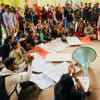Shaping futures: Women's rise in Bangladesh's higher education

When I left for the US for grad school in the mid-80s, Bangladesh was different. The face of economic growth were all men; women were playing second fiddle at best. Almost three and a half decades later, when I returned and accepted my first job in Bangladesh as the Vice Chancellor of Independent University, Bangladesh (IUB) three years ago, I was in for some big surprises.
Women were outperforming men in public examinations; major conglomerates had women at their helms; they had taken the startup and entrepreneurship scenes by storm; the development sector was thriving with their customary compassion and innate humanitarianism—to name just a few in addition to their overwhelming participation in agriculture and readymade garments industries. Historically, such confidence and drive were there in our men, but what struck me most was the newfound zeal and ambition prevalent in women as well.
As a professor of finance, I knew about the development buzzwords that were going around—"diversity" and "equity". I also bought into "inclusion", specifically because of Bangladesh's demography. They are all key prerequisites for achieving sustainable development, and eventually, high-income status by 2041. Immediately, I felt the urge to be a part of this change. When I joined IUB in 2021, merely 38 percent of its student body comprised of women. For me, that was not even close to adequate because Bangladesh's demographic data showed a 51-49 ratio, tilted in favour of women, and I embarked on an expedition to emulate that. In the three years since then, the ratio of female students at IUB has gone up to 43 percent.
It wasn't as if we moved any mountains or crossed any seas. Universities should consider it their primary responsibility to support the national agenda to the best of their abilities. Passing the higher secondary exams was not the end of the road. The world is much bigger and to thrive in it, quality higher education was the key. Our young women and their parents and guardians must feel that quality education and a secure and enabling institution for higher education are not utopian. So, how can we make a university women-friendly and secure? There must be separate prayer spaces, infant care corners, physical wellbeing facilities such as yoga and self-defence, sports facilities and women-centric competitions, women in academic and administrative leadership roles, holistic and targeted physical and mental health care services, and most importantly, a place where the community's voices are heard.
Having more female students comes with a two-fold benefit. First, since women were outperforming men in public examinations, having more of them automatically raises the bar for the overall quality of the student body. Second, it allows a university to directly contribute to the national pursuit of achieving sustainable, inclusive development by ensuring quality education for a significant segment of the population.
Bangladesh is currently experiencing what has come to be known as the "demographic dividend"—having more people in the working-age population group than in the dependent population group. It's a rare socioeconomic phenomenon that only comes to a handful of countries and lasts only a few years. For Bangladesh to reap the benefits of the demographic dividend, we need all hands on deck, and by all hands, I mean both men and women. Therefore, by ensuring quality education for more women, a university can play its part in pushing the national agenda for sustainable, inclusive development forward.
However, there are dire predictions that the progress we have made might be severely offset by climate change. Bangladesh had the least to contribute to global warming; yet, we are among the biggest sufferers. Women and children suffer the most when natural disasters hit. Yet again, it is our women who often play the lead role during recovery. The United Nations advocates for "women-led climate resilience" to elevate "women and girls as changemakers in their communities, enabling them to lead resilient, local, and rights-based solutions to climate adaptation."
Therefore, we want our students to be aware of their climate roles and rights, especially when they work at the community level. They need to be responsible towards their environment; they need to be technologically competent to reap the benefits of the Fourth Industrial Revolution, responsibly; they need a strong foundation in liberal arts education and be globally conscious to develop qualities such as humanitarianism and compassion towards foreign cultures. Together, these prepare our students, especially our women, to become the changemakers of a future that is punctuated with numerous challenges, and yet hold the hope for a more equitable society. The world has already taken notice of our nation's growth and remarkable capacity for change. It is fitting that we ensure we are also doing the same.
Tanweer Hasan is the vice chancellor, Independent University, Bangladesh (IUB).
Views expressed in this article are the author's own.
Follow The Daily Star Opinion on Facebook for the latest opinions, commentaries and analyses by experts and professionals. To contribute your article or letter to The Daily Star Opinion, see our guidelines for submission.

 For all latest news, follow The Daily Star's Google News channel.
For all latest news, follow The Daily Star's Google News channel. 










Comments